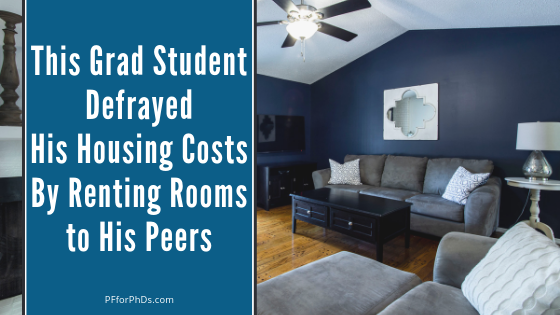In this episode, Emily interviews Dr. Gov Worker, which is the moniker used by a PhD scientist and FIRE blogger. FIRE stands for Financial Independence and Early Retirement. As a PhD, Gov Worker’s motivation for and path to FIRE are different than most and specific to his high degree of training, and he thinks other PhDs should consider FIRE as well. In this first half of the conversation, Gov Worker fleshes out the FIRE movement for us, including why the current stereotypes are inaccurate and harmful, discusses what pushed him to pursue FIRE, and details what his family is doing to achieve FIRE.
Further Listening: This PhD Government Scientist Is Pursuing Financial Independence: Part 2
Links mentioned in episode
- Financially Navigating Your Upcoming PhD Career Transition
- Personal Finance for PhDs Podcast Hub
- Volunteer as a Guest for the Podcast
- Government Workers Pursuing FI (Financial Independence)
- Rich Dad, Poor Dad: What the Rich Teach Their Kids About Money That the Poor and Middle Class Do Not! by Robert Kiyosaki (affiliate link – thanks for supporting PF for PhDs!)
- Your Money or Your Life: 9 Steps to Transforming Your Relationship with Money and Achieving Financial Independence by Vicki Robin (affiliate link – thanks for supporting PF for PhDs!)
- PFforPhDs S1E11: This Prof Used Geographic Arbitrage to Design Her Ideal Career and Personal Life
- PFforPhDs S3E7: This PhD Student Is Paying Her US Student Loans with Her Swedish Krona Salary
- PFforPhDs S2E7: How to Successfully Plan for Retirement Before and After Obtaining Your PhD
Teaser
Dr. Gov Worker (0:00): As academics we spend so much of our time identifying ourselves as a as our career like I am an expert in this field or I am like the world’s top person in this and I travel around the world and I talk about this and I got invited to conferences because I am this person I was like whoa I don’t have to be that person anymore I can just be myself and I myself is so much more than my professional expertise and why did I lose sight of that so that was a really powerful thing to me and that made me that completely changed my life.
Introduction
Emily (0:39): Welcome to the personal finance for PhDs podcast. A higher education in personal finance I’m your host Emily Roberts this is season 3 episode 8 and today my guest is Dr. gov worker which is the moniker used by a PhD scientist and fire blogger. Fire stands for financial independence and early retirement. Gov Worker and I had such an engaging and in-depth conversation that I’ve split it into two episodes this one and next weeks in this episode Gov Worker tells us what fire is what pushed him to pursue it and what his family does to pursue it without further ado here’s the first part of my interview with Dr. Gov Worker.
Please Introduce Yourself
Emily (1:24): Thank you so much for joining us on the podcast today. I have the great pleasure of having a conversation today with someone who goes by the moniker gov worker maybe we should say dr. gov worker and this person gov worker I really wanted to find someone to talk to us about fire which is financial independence retire early which is a really big trend right now in the personal finance movement and it’s actually come up on a couple of our previous episodes one with Dr. Amanda and one with Crista Wathen and so I wanted to find someone who would really speak to this specifically and thankfully, gov worker and I have a mutual connection on Twitter and I found I found him through that person. So Gov Worker thank you so much for joining us this morning I’m really looking forward to this conversation would you please tell us a little more about yourself?
Dr. Gov Worker (2:15): Yeah thanks Emily, before we get started I should say that I’m speaking in my personal capacity and my views are not representing the government so they’re my own views so I’m a government researcher I got my PhD in 2009 I live in a flyover State and I’m happily married with three daughters that’s kind of having kids or three kids it’s kind of rare for fire so we can talk about that later on I started blogging just a few months ago because I realized well there’s a lot of fire bloggers and there’s a lot of people in the personal finance space pursuing fire a lot of them aren’t like me necessarily in that they have a PhD or that they have a government job and these these are things that make pursuing fire different from typical scenario so I wanted to kind of write content that would help people in these type situations like optimize their decisions for pursuing fire.
What is FIRE?
Emily (3:21): Yeah I’m I’m so happy to hear that actually matches really well with the reasons why I started blogging about personal finance back in 2011 not my current website but the one before that some listeners may be aware of my previous site evolvingPF.com and I was getting really interested in the personal finance space at that you know in the couple years leading up to that time and I also didn’t see myself as a graduate student represented in the space not even just as a graduate student but as kind of a lower earner I mean most of the people I saw writing I would say I was in the bottom 1% in terms of incomes of the people I started writing about personal finance which kind of makes sense few different reasons but anyway so that’s very similar to why I started writing and I’m so glad that you did because as we’ll talk about and you mentioned you sort of defy a couple of the the stereotypes about fire which we’re happy to go into. So first for audience who has no idea what fire is can you give a really brief definition
Dr. Gov Worker (4:21): Yeah so so fire is an acronym for financial independence and early retirement I guess they switch the R and the E. So in my mind those are two really separate goals but they kind of get lumped in together as one acronym and one movement.
Emily (4:36): When I first started started learning about personal finance being financially independent meant being financially independent from your parents it was like a young adult goal right so go into what each of these things means please.
Dr. Gov Worker (4:48): Right so financial independence is a state of being where you have passive income so that’s income that your money is making for you that exceeds your living expenses so I mean in that essence like even if you retire at 62 and live off of Social Security you’re I guess in some ways financially independent at that age because you’re not earning money and you’re living off of income that you don’t have to work for so that’s passive income and in the fire movement it’s it’s kind of roughly the rule of thumb is if you have 25 times your living expenses saved that you can generate enough returns on your investment to live comfortably off withdrawing 4% so 25 times your expenses or 4% of your liquid net worth that’s kind of this financial independence and some people debate whether it should be 25 or 30 or some multiple but you can look up a whole bunch of stuff on that but this idea is that you amass a pile of money and that money makes money and you live off of what that money makes for you and it could be through like rental properties it could be through stock market returns it could be through like dark arts I don’t know but you the like goal of the fire movement is to save enough money that your money works for you and you don’t have to work for a living you don’t have to you can work but it doesn’t have to earn money so you could do things that don’t make money like blogging or something that you really enjoy doing and create things but it doesn’t have to it could be disassociated from a paycheck because your money is earning your living expenses.
Financial Independence vs. Early Retirement
Emily (6:35): Yeah and there’s the there’s the key difference between financial independence and early retirement right in early retirement you are committed to not working anymore whereas in financial independence it’s just an option can work more you cannot your good either way is that right?
Dr. Gov Worker (6:50): Yeah and I mean I think there’s kind of a joke in the fire movement about this internet retirement police that like if you do achieve financial independence and you quit your main job so like if I stopped becoming a government researcher because I reached financial independence but I was still earning income doing other things and you know internet trolls might say I’m not really retired so early retirement is kind of a weird nebulous thing that I don’t feel is very well defined but I guess my goal is to achieve financial independence where I don’t need to work if I don’t want to and then I can make a decision well do I want to work part time do I want to work in an academic lower stress environment once you achieve financial independence you have a whole bunch of options available one of which is like completely quitting your profession and walking away forever which is an early retirement but you could do like a phased retirement or some part-time work or something in your field that’s different so I think just achieving some space between oh I need this paycheck to live and working because you have to and working because you want to is really important and so even if you’re not pursuing early retirement I think it’s really worth trying to pursue fire because even if you don’t reach financial independence say you’re starting off with a lot of debt or starting off from a different space and you do you think financial independence are away if you work towards that even just getting you know six months salary saved up gives you options if you’re in a toxic work environment and so I think if fire doesn’t resonate to you as a listener like don’t just shut off the podcast because there’s a lot of good that can come from working towards getting in a better financial space and that’s why I think the movement is so important for everyone even if early retirement is not for everyone.
What Are Some of the Stereotypes Associated With FIRE?
Emily (8:51): Yeah great point because when I first heard about this movement in I don’t know 2012-2013 something like that it was it was I don’t even think the acronym fire was being used at that time because really people were talking about early retirement and I wrote a post for my site that was like early retirement I don’t care about that that’s not for me and I’m gonna dismiss this whole movement but actually I had a commenter on that post come back and say well no Emily like you are pursuing financial independence you might not be pursuing it particularly early or whatever but obviously by wanting to generate more financial security for yourself being aggressive about saving for retirement you are pursuing financial independence so don’t dismiss this movement and frankly it’s based on some of the stereotypes that I heard about the movement at that time which we can discuss so these stereotypes that you see let’s still see in the media today are like well fire is being pursued by young male single childless tech workers engineers that kind of thing it’s not for people who have lower incomes it’s not for people who have families it’s not for people who live in high cost of living areas so I note I mean brought this up earlier like let’s dispel some of those stereotypes.
Dr. Gov Worker (10:11): Yeah I mean I think you put it very kindly but I mean you know I would say like a single white male who learned to code and got a really high paying job and it may be even anti-social so like doesn’t even fully understand these like things that people want to spend money on and there’s nothing wrong with spending money on things on the path to fire if that’s what brings you happiness it’s about in my mind financial independence is about spending money on what makes you happy and then like not spending money on other things just because other people spend money on them so I think the stereotype and then these people like not only are they in the mainstream media but are on social media and comment I think there’s a lot of this like bootstrap mentality that like well I you know I make all this money and so if you don’t do it then you aren’t working hard because I was able to do this which ignores a lot of privilege and other factors that go into this and if you start if you want to find out about fire and that is like the first resource you find and it doesn’t resonate with you there are tons of people pursuing financial independence or fire and you just need to find a story that resonates with you because there are stories about you can find peoples that are blogging and being really open about destroying mountains of debt they have student debt credit card debt any kind of debt and those stories are really powerful. You can find like you know there’s a lot of diversity in the bloggers and so everybody’s got these really great stories and you just got to find one that resonates with you and helps you that you can put yourself in you’re like that person shoes and like he’s like yeah they’re doing these things and we’re going through the same problems and that’s inspiring me to like work on my my finances and I just if I could like help anyone on this podcast just fine tell them that there’s somebody out there that’s probably writing a story that’s very similar to their is they should like go find this person and not just immediately get turned off right away by this fire because like early retirement sound so extreme and you’re like oh I can never do that I have that or I can never do that like I’m first-generation college or I could never do that because I grew up in this really bad neighborhood like there’s people who are who are writing about you know those exact situations and I just I just want to let people know it’s way more inclusive than you might think of if you just hear it like off the news or something.
What Led You to the FIRE Movement?
Emily (12:51): Yeah we hear so much in academia in science about the importance of having models and mentors who you can identify with on some of these you know demographic factors for example so I so appreciate your point that like yeah don’t get turned off by you know one random article that you read that only features you know this type of person like there’s so many different types people in this movement and it’s important for everyone really so let’s let’s go down to into what more specifics about you especially with you as a PhD because you know it was a little bit hard for me to track down a PhD in the fire movement who was willing to talk about this so I really want to have that aspect modeled for our listeners of how a PhD can pursue fire or at least how you are as a PhD. Let’s let’s start with what led you to this movement in the first place?
Dr. Gov Worker (13:48): Money Magazine did a feature about the fire movement last year and that was kind of the first exposure I’ve had to it I know I know people have been writing about this like mister money mustache is the most famous he started in 2011 and I just had never run across that I mean I’ve always been interested in finance like I got exposed to like the Rich Dad Poor Dad* books in like high school and was always thinking about he’s really big about passive income but his books are kind of like if you think hard enough it will like money will magically come to you or something but I mean that kind of had this idea and I was like my wife and I are natural savers but it never occurred to me that you could like retire early until I read this feature then I read Your Money or Your Life* which is like the key cornerstone book it was written I think 30 years ago by Vicki Robin it’s awesome and that book completely changed my life because at the time I was extremely stressed in my job I was kind of experiencing burnout I was having to travel a lot and I think like in academia or when you’re getting your PhD like it’s just always implicitly assumed that you’re gonna like try for like landing a major like r1 university job or like the whole mindset of my PhD experience is like you need to be the top of your field and if or like you need to at least try to be the top of your field and if you don’t get there well that’s okay because but it’s never an option just be like well I want to spend time with my family or I want this right it’s all about being the best and I worked really hard on that for a decade and it wasn’t and I guess objectively I achieved a lot of career success you know recognition and accolades and that kind of stuff but it wasn’t fulfilling because it it wasn’t ultimately what I wanted but it was really hard for me to see that that wasn’t what I wanted until I achieve career access success and then realizable why did I just spend a decade pursuing that. Reading that book just really helped me rephrase things there’s a key concept in this book that like your job is just the place where you exchange your time for money and I was like whoa like because as academics we like spend so much of our time identifying ourselves as a as our career like I am an expert in this field or I am like the world’s top person in this and I travel around the world and I talk about this and I got invited to conferences because I am this person and I was like whoa I don’t have to be that person anymore I can just be myself and myself is so much more than my professional expertise and why did I lose sight of that so that was a really powerful thing to me and that made me that completely changed my life so that was kind of how I discovered fire and how it impacted me.
[* This is an affiliate link. Thank you for supporting PF for PhDs!]
Personal Finance
Emily (16:56): Yeah of course I want to add in something in response to that though first which is that I had sort of a similar experience in a different way during graduate school when I was learning more and more about personal finance because one of these I mean really the bedrock concept in all of personal finance is regarding understanding what your own personal values are and aligning your use of money with your values with what brings you the most satisfaction in your life and I totally agree with you that inside academia inside you know work in science um our identity does become so closely tied with our profession that it’s difficult to remember that you are a whole person needs and desires outside of that and for some people their professional accomplishments and career success is the most important thing to them but that’s not everybody within academia and I think for me learning more about personal finance and realizing this caused me to do some more introspection and it’s one of the reasons why I you know decided not to pursue a more traditional career following graduate school and why instead I’m doing this because I really love this you know helping other people in my community make the most of their money so I just I really resonate with that it sounds like our exposure to the subject area even though there are slightly different variations and personal finance really caused a similar kind of change in both of us.
Commercial
Emily (18:28): This summer I’m putting forth extra support for PhDs undergoing career transitions into grad school a postdoc or a real job if you’re moving on to the next stage in your career or thinking about it please visit pfforphds.com/next to check out my articles, webinars and coaching program allow me to come alongside you during this transition to ensure that you set yourself up for financial success.
What Are You Doing on Your Path to Financial Independence?
Emily (18:58): So yeah I’d love to now dive into more about how one pursues fire you know should one want to so specifically for you what are you doing on your path to FI?
Dr. Gov Worker (19:11): Yeah so let’s see so a couple things so we before even kind of pursuing the FI path my wife and I are always very frugal like back when you could really coupon things like local newspaper did an article about my wife’s like incredible couponing skills and we’ve always lived way below our means because we didn’t really feel the need to to keep up with things so like we both ride our bicycles to work so we don’t have to pay for parking or cars or stuff we have a 10-year mortgage which were pre paying and anytime we had gotten a raise so when we started off our marriage I got married young when I was still in graduate school and my wife was working at that time and we had like absolutely no money but every time we got a raise we would just say well we’re living just fine so we would save the raise in some account like a savings account or sometimes we increased retirement accounts or other things and so we’re always just used to when we got an increase not increasing our standard of living and it would always seem like we’d be doing really well financially and then have a baby and then like a huge percentage of our salary would then go to daycare and kind of bump up that way so in many ways we’re still living well we have improved their standard of living since like the depths of graduate school but not not by much and every time we get a raise or a bonus or anything it’s like how can we save it and so that was what we had always done and that’s what fire people would tell you to do of course the fire people are gonna say like save it in retirement account but since we weren’t necessarily focused on that goal we would save it up for like improving something on the house or maybe taking a vacation or just saving it in a emergency fund or something else so that that that stuff all kind of came naturally to us.
How Did You Manage to Keep Your Living Expenses in Check When You Did See an Increase in Income?
Emily (21:19): I want to go a little bit more in depth about a couple things you just mentioned one is the time when you were in graduate school so that’s gonna speak to a lot of my audience right now currently in graduate school. Can you just talk a little bit more about how you managed to keep your living expenses in check when you did see an increase in income because I do think there’s a tendency to you know when you let’s say get out of training sounds like your wife had a regular job maybe she was experiencing raises more frequently than you did as a graduate student but like when you get that next position out of graduate school and there’s a big bigger bump in your salary how were you not just like I’m gonna go like wild and really raise my standard of living spend all this because there’s all this pent-up demand or desire.
Dr. Gov Worker (22:16): Yeah I think it was probably I think the first part of your your comment did kind of address that so my wife my wife had a traditional job or non I mean she’s highly educated as well but when I was in graduate school she was working and so I think my graduate school I wasn’t as destitute as if I were single and just living off of my stipend it it also happened that I transitioned from graduate school into a job in the same city in which I graduated so we didn’t need to move or anything so we were already living in a house at that time in the city and my wife was making money so it was kind of a real just well now I’m gonna go here instead of over here and it didn’t it wasn’t a wholesale change so it wasn’t like I was was really really stretched and then got a job across the country and like oh I’ve got my first job and my first salary at you know I’m gonna go crazy it was really nice to have that bump I mean we were really stretched because we had my daughter about two years before I graduated and so day care was a huge cost and and that kind of stuff so it give us some financial breathing room and I did get my first job and then getting kind of promotions you know throughout my career since then has just given us more more breathing room. You know I look back at my time in graduate school as and maybe this is like selective bias and filtering out like bad experiences because I know graduate school is very tough not just financially but emotionally as well but I do look back on a lot of the things we did socially then with you know just happy fond memories of kind of pulling together with this community of graduate students who is all kind of struggling and like having a really good time like that and now that we’re removed from graduate school and we’re professionals and we have kids and like the social interactions we have are like a lot different from those times and so kind of keeping that you know framework and community together of people going through similar situations I think is really key thing to like keep in mind.
Emily (25:00): That was great actually and I I just wanted to talk a little bit more about you know you’re reflecting on that time to kind of make your current situation a little bit more relatable to my audience because I mean you could look at someone you know several a decade out from graduate school who’s on this path to financial independence and think like what like that’s so far distant from where I am I could never achieve that I’m just a graduate I’m just a postdoc whatever it is at this time but that’s why I wanted to like sort of make this connection to you back at that time so it sounds like you were living in maybe a little bit better than the average guide student lifestyle because of your your wife’s job and having these wonderful low-cost experiences in social life with your fellow grad students which I really love and miss as well. And then as you guys were increasing in your salaries at work you only slightly maybe increase your standard of living you didn’t really move at least it right away it sounds like and really you just sort of kept living more or less the same life style that you had during graduate school. This is something that I have talked about before on the podcast for instance my interview with Dr. Brandon Renfro we talked about really trying to keep lifestyle inflation lifestyle creep in check when you receive those raises so it’s just good to have an example of someone who did that.
Outtro
Emily (26:21): Listeners I’m so glad you joined us for today’s episode pffordphds.com/podcast is the hub for the personal finance for a phd’s podcast. There you can find links to all the episodes show notes, a form to volunteer to be interviewed, a survey, and a way to join the mailing list I’d love for you to check it out and get more involved see you in the next episode. The music is stages of awakening by Poddington Bear from the free music archive and a shared under CC by NC podcast editing and show notes creation by Jewel Lipps.






